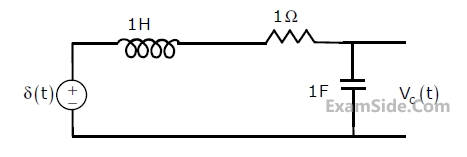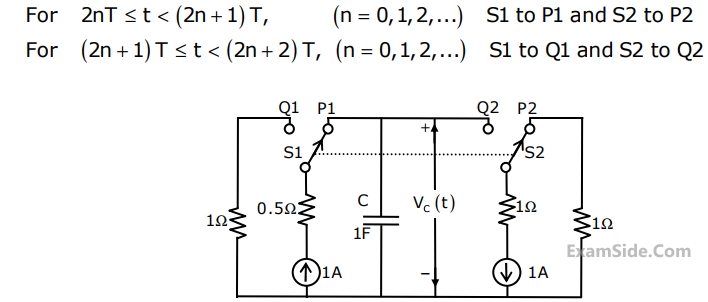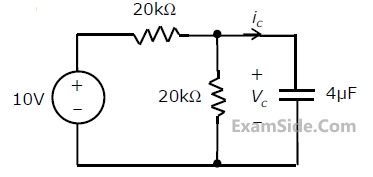1
GATE ECE 2008
MCQ (Single Correct Answer)
+2
-0.6
The following series RLC circuit with zero initial conditions is excited by a unit
impulse function $$\delta$$(t).
 For t > 0, the output voltage Vc(t) is
For t > 0, the output voltage Vc(t) is
 For t > 0, the output voltage Vc(t) is
For t > 0, the output voltage Vc(t) is2
GATE ECE 2008
MCQ (Single Correct Answer)
+2
-0.6
The circuit shown in the figure is used to charge the capacitor C alternately from two current sources as indicated. The switches S1 and S2 are mechanically coupled and connected as follows

Assume that the capacitor has zero initial charge. Given that u(t) is a unit step function, the voltage Vc(t) across the capacitor is given by
3
GATE ECE 2008
MCQ (Single Correct Answer)
+2
-0.6
The following series RLC circuit with zero initial conditions is excited by a unit
impulse function $$\delta$$(t).
 For t > 0, the voltage across the resistor is
For t > 0, the voltage across the resistor is
 For t > 0, the voltage across the resistor is
For t > 0, the voltage across the resistor is4
GATE ECE 2007
MCQ (Single Correct Answer)
+2
-0.6
In the circuit shown, VC is 0 volts at t = 0 sec. For t > 0, the capacitor current iC(t), where t is in seconds, is given by


Questions Asked from Transient Response (Marks 2)
Number in Brackets after Paper Indicates No. of Questions
GATE ECE 2023 (1)
GATE ECE 2018 (1)
GATE ECE 2017 Set 2 (1)
GATE ECE 2016 Set 2 (1)
GATE ECE 2016 Set 3 (1)
GATE ECE 2015 Set 2 (1)
GATE ECE 2015 Set 1 (1)
GATE ECE 2014 Set 4 (1)
GATE ECE 2014 Set 2 (1)
GATE ECE 2011 (1)
GATE ECE 2010 (1)
GATE ECE 2009 (2)
GATE ECE 2008 (3)
GATE ECE 2007 (1)
GATE ECE 2006 (2)
GATE ECE 2005 (1)
GATE ECE 2004 (1)
GATE ECE 2003 (2)
GATE ECE 1996 (1)
GATE ECE 1992 (1)
GATE ECE 1990 (1)
GATE ECE 1989 (1)
GATE ECE Subjects
Signals and Systems
Representation of Continuous Time Signal Fourier Series Fourier Transform Continuous Time Signal Laplace Transform Discrete Time Signal Fourier Series Fourier Transform Discrete Fourier Transform and Fast Fourier Transform Discrete Time Signal Z Transform Continuous Time Linear Invariant System Discrete Time Linear Time Invariant Systems Transmission of Signal Through Continuous Time LTI Systems Sampling Transmission of Signal Through Discrete Time Lti Systems Miscellaneous
Network Theory
Control Systems
Digital Circuits
General Aptitude
Electronic Devices and VLSI
Analog Circuits
Engineering Mathematics
Microprocessors
Communications
Electromagnetics



